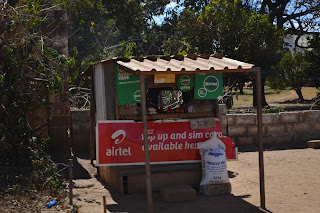Talk about culture shock. It’s
almost harder to adjust to being back than it was to learn to live in Zambia! Not
kidding. It's really really frustrating!! But more than that, I already
miss the people a crazy amount. I miss Ruthie calling me Auntie Molly, I miss
walking into class to an excited group of students chiming “Good morning
Madam!” I miss praying with the widows, I miss laughing with my friends during
lunch. How can I ever describe my experience in Zambia? It’s heartbreaking and
confusing and an incredible gift to have your heart on multiple continents,
that’s one thing I know.
Another thing I know is the work I
did was very small. But I’m incredibly thankful. I think many of the
relationships I built in Zambia were just beginning, and it’s so, so, so hard to
leave knowing how much more room there is for growth. There is so much more to
these people than I was able to learn in my short time in there, and I’m truly
grateful that they allowed me to be a part of their lives!
“Africa time” drove me crazy at
first, really crazy. Everything takes a long time, meeting times are simply
suggestions, and rapidity is not an end. But it was an incredible lesson in
remembering my own unimportance; to relax about “my” time and value any time I was able to have with
anyone. And I think the Africans have something figured out we Americans
haven’t quite grasped—building relationships takes time. You HAVE to slow down
to build meaningful relationships. This work is valuable. Relationships are
the building blocks of eternal things. And there are little ways to do this
wherever we are, like trying to shut off the phone while talking to someone,
valuing their time and their words above your own, and staying patient. I’ve
seen the contrast—it seems that often in the US we seek surface-level
relationships that are convenient for us, require minimum commitment and
vulnerability, and maximize benefit for ourselves. When that’s what we’re
seeking, it’s not about celebrating the other. It’s about serving the self. We
often don’t even realize how empty it is until we open up our lives to others. When
you’re sharing life with people, you share burdens and victories. It was my
privilege to do this with friends in Africa.
I don’t want to waste any time or miss the opportunity to treasure the
amazing people around me, be it at home or abroad.
It really is different now that extreme
poverty isn’t an idea, but it’s the issue faced by real people, strong people,
that I know by name and face. I’m sad, so so sad. Truthfully, the need in
Zambia is overwhelming and very present. There are things I still don’t know
how to write about, like visiting the prison when I was so upset my peanut
butter sandwich wanted to come right back up, or seeing a dirt-covered child
lying in a ditch in the compound. I feel like there’s a huge part of me that’s still in Zambia,
still desperately wanting to stay with the people, and that’s really hard to
explain to people here.
There is a weird juxtaposition of
technological progression and desperate poverty in Lusaka. The crazy thing is,
this juxtaposition exists in the US too. Lusaka may have a mall and Airtel, but
there’s also a significant amount of the population living on far less than a
dollar a day. Poverty exists in the US too…we can access resources,
communicate, and transport with ease, yet the US has incredibly high rates of
depression, loneliness, suicide and broken families. God made the African
people beautiful and wonderful, as well as the American people. How blessed am
I that I’ve had the opportunity to serve both! I have hope; I’ve seen hope.
Ask me!!
There are
still so many things I don’t understand, but Africa is a part of me now. I’m
blessed because of this trip; blessed that my world is a bit bigger, and blessed that my new world is
full of incredible people I don’t deserve. I’m not sure where my place may be,
but I’m thankful. And I’m excited to find out what the future holds, whether
it’s just a next step or the whole path. I’m nervous about being home, so
please be patient with me when I accidentally go to the wrong side of the car,
or start dozing at noon, or get angry or sad. I cannot wait to see you all! But
the question everyone asked as I prepared to leave was, “when will you be
back?” And I hope the answer is, very soon.
My sponsor child Deborah, who has been pictured here several
times, lives in a one-room house in the compound. Her walk to school is at
least an hour, through flea-ridden markets and disease-filled neighborhoods.
Her sister Anna loves to carry her stuffed animal on her hip like moms carry
babies in Zambia, and Deborah loves to laugh and loves second grade. She is an
amazing, amazing person. And I have the honor of sponsoring her! These kids are
my friends; they are people I know who are struggling to survive. I can’t even
tell you how much joy it would bring for me to know that more are being cared
for by people I care for! Being away from these kids is really hard. But my
being here is totally worth it if it means just one more kid can eat and
receive life-saving medical care.
A child here could very easily die of strep throat, and an
estimated 40% of Zambians are stunted. I know these kids; I can tell you about
their homes, their lives, their siblings, I can show you pictures of them, I
can tell you stories about them. I’ve seen what it’s like to live in the
compounds. And I know how much EVERY SINGLE CHILD is a treasure! Honestly, there's so much need and so much for which I'd love to advocate. But if there's anything I can attest to, it's the life-changing difference of an education, healthcare, and nourishment. If you’ve
enjoyed following this blog and would like to make a difference in the life of
a child who may not be able to eat, receive medical care, attend school or know
how loved they are, please consider sponsorship. Though this difference could
never be quantified, it’s like skipping going out to dinner once a month to
save a life. What a gift that we can do that! Sponsorship through Chikumbuso
also supports the widows’ work and grandmother outreach, and makes it possible
for people living in poverty to survive and thrive.
Mother Teresa said, “be faithful in the small things, for
there your strength lies.” I know the work I did in Zambia was in the category
of “small things,” and I want to keep doing these “small things” in building
relationships and living in service when here in the US. Sponsorship, by being
faithful in things that seem small here, can literally save and transform a
life there. Yes through the resources, but also through the relationship. The
things in our lives that truly are small—like sacrificing a dinner out—can mean
the transformation of the life of another. And we’re the ones receiving a gift
in giving. Follow this link! http://www.chikumbuso.com/sponsorships/
If you would like to support Mercy Ministries, in their work
with HIV/AIDs widows, the incredible but barely funded school, the feeding
program, or the teachers, please just contact me at crane.molly3@gmail.com. The children
at Mercy changed my life, and many are struggling to simply afford the
notebooks made out of loose paper bound in newspaper; many have shoes that are
barely attached, or none at all. They are incredibly intelligent and wise; full
of joy and gracious; strong and loving. I can send you, though I can’t post
them online, pictures of the kids you’re loving. Mercy is Zambian-run, and I
spent a great deal of my time there. I even have videos of the kids! You can get to
know them a little! Just email me.
I’d love to answer any questions you have about postings
here, life in Zambia, or how you can help in other ways. Please email me! Thank
you so much for sticking with me throughout this process, and for reading!
My girl Debobrah!
This is her absolutely beautiful sister Anna...I love her already
As far as I know, Deborah was the first child in this group to receive sponsorship and one of the very few to be able to attend school. Let's make it possible for more to feel cared for!
Poaching is such a big problem that rhinos are guarded 24/7 by rangers with AKA-47s...
...and this guy was like, sit here and I'll take some pictures, don't worry I'm watching your back! I'm pretty sure on the list of ten things to never do, turning your back to a rhino is somewhere near the top. Whoops.
Did you know that crocodiles are so fat they sometimes break their own toes when they stand up? It's true.
Victoria Falls...honored and amazed and not at all surprised that it's one of the seven wonders.
But Deborah, and all the kids at Mercy and Chikumbuso, are as wonderful and awe-inspiring as the falls could ever be. What amazing gifts.











.JPG)









.JPG)



























